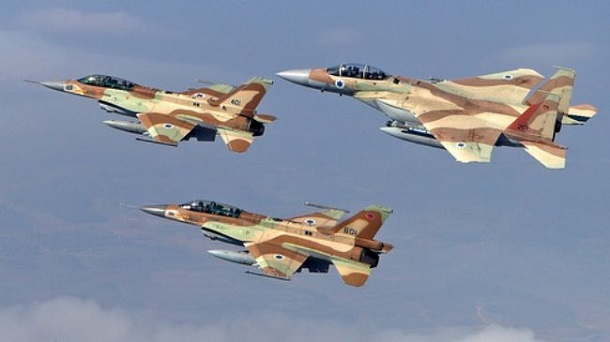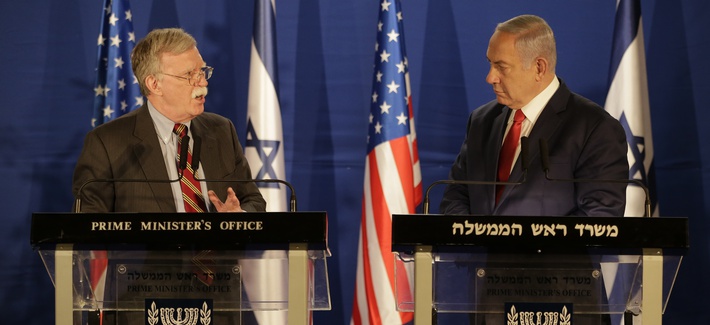Australia/Israel Review
Behind the News – February 2019
Feb 4, 2019 | AIJAC staff

Rocket and Terror report
According to annual reports published by Israeli security agencies, about 1,000 rockets and mortars were fired at Israel during 2018. Sixteen Israelis, including nine civilians, were killed and 199 injured in 87 terrorist attacks during the year. The Shin Bet security agency said it had thwarted 480 attacks and 590 potential lone wolf attacks and destroyed 15 tunnels into Israel in 2018.
Despite Qatar’s financial intervention and Egypt’s diplomatic engagement, violent “March of Return” riots along the Gaza border continue to take place every Friday. Two rockets have been launched into Israel from Gaza since January. On Jan. 22, an Israeli soldier was wounded by sniper fire from Gaza.
Israel ends Northern Shield operation
Israel has declared the end of “Operation Northern Shield” after finding and destroying the sixth Hezbollah attack tunnel dug from Lebanon into Israeli territory. The sixth tunnel was 800 metres long and was also the most sophisticated, equipped with railway tracks, steps, electricity and lighting.
Israel commenced “Operation Northern Shield” on Dec. 4 to deprive Hezbollah of its ability to use the previously secret tunnels for intended offensive attack against Israeli communities. The IDF says it believes it has found all cross-border tunnels constructed by Hezbollah.
Israel and the UN Interim Force in Lebanon (UNIFIL) have condemned the tunnels as a violation of UN Resolution 1701, adopted to end the 2006 war between Lebanon and Israel.
Israel takes credit for major strikes in Syria
Israel has acknowledged that it was responsible for airstrikes against Iranian and Hezbollah targets in Syria on Jan. 20 and 21.
During the Jan. 20 airstrike, Israeli planes reportedly hit Iranian and Hezbollah targets at the Damascus International Airport and in the nearby towns of al-Kiswah and Jamraya.
Later that day, a surface-to-surface missile aimed at the Israeli ski resort on Mt. Hermon in the Golan Heights, and believed to have been launched by Iranian forces operating in Syria, was intercepted by Israel’s Iron Dome anti-missile battery.
In response, the Jan. 21 Israeli strikes targeted Iranian weapons storehouses, intelligence facilities and a training camp near Damascus, as well as Syrian air defence systems that fired on the Israeli fighter jets. Up to 21 people, 12 of them Iranian fighters, are reported to have been killed in the raid.
Israel’s public confirmation of its strikes in Syria was in line with a recent departure from its previous policy of ambiguity.
Abbas dissolves Palestinian parliament
On Dec. 22, Palestinian Authority (PA) President Mahmoud Abbas announced that the Palestinian Supreme Constitutional Court had ruled that the Palestinian Legislative Council (PLC) should be dissolved and called for elections in six months, adding that he would “execute this [decision] immediately.”
The PLC has been inactive since the 2006 parliamentary elections resulted in a Hamas majority, which led to civil war in 2007 between the two rival Palestinian groups, Hamas and Fatah. Analysts suggested the move to dissolve parliament was aimed at preventing Hamas from vying for control of the PA should the 83-year-old Abbas need to step down suddenly.
Meanwhile, on Jan. 7, the PA withdrew its “Presidential Guards” unit that had been manning the Egypt-Gaza border crossing at Rafah since Egypt oversaw the signing of a reconciliation agreement between Fatah and Hamas in late 2017.
The agreement, never fully implemented, has now collapsed entirely, and Hamas has retaken full control of the border crossing. Egypt responded by closing the crossing to inbound crossings from Gaza, subject to review.
Satellite launch or ballistic missile test?
On Jan. 15, Iran launched a rocket carrying a satellite. Teheran announced that the launch had failed, since the Simorgh rocket did not reach the speed required to put the satellite into orbit.
However, Israel’s PM Binyamin Netanyahu claimed the rocket’s true purpose was not to launch a satellite into space but to test “the first stage of an intercontinental missile”. US Secretary of State Mike Pompeo agreed, accusing Iran of using its space program as cover for developing ballistic weapon delivery systems for its nuclear weapons program.
Another secret Iranian nuclear facility exposed
A Jan. 11 report by the US-based Institute for Science and International Security (ISIS) exposed a previously unknown and undeclared alleged nuclear site in Iran. The report by former senior International Atomic Energy Agency (IAEA) official Olli Heinonen and former UN weapons inspector David Albright was based on original evidence obtained from Iran’s secret nuclear archive procured by Israeli intelligence last year.
The material analysed, which included photos, emails and official documents, dealt with the Shahid Boroujerdi Project. According to this evidence, in 2002 Iran was building a large, secret underground nuclear tunnel complex at Parchin, about 35 kilometres from Teheran, allegedly to facilitate Project Shahid Boroujerdi’s goal of fabricating uranium metal components for nuclear warheads.
The ISIS report calls on the IAEA to study the previously unknown site and the activities conducted in the location. In recent weeks, Israel and the US have criticised the IAEA for failing to follow up the new information arising from the nuclear archives with new inspections.
Iran’s economy in recession
Iran’s economy has officially entered a deep recession according to recent indicators. On Jan. 16, Iran’s chief statistician reported a 27% unemployment rate among young Iranians and 40% among university graduates. Exports of non-oil products have also reportedly plummeted to less than half of Iran’s monthly average since US-imposed sanctions took effect on Nov. 4, while oil exports were down 60% in December compared to previous months.
This economic hardship was reflected in the regime’s 2019-2020 budget, submitted in late December, which calls for slashing Iran’s defence budget by 28%, including a cut of 17% to the Revolutionary Guard Corps.
In related news, on Jan. 8, the European Union announced new sanctions on Iran’s intelligence services following the exposure of Iranian assassination plots against dissidents inside Europe.
Malaysia Swimming Controversy
The International Paralympic Committee (IPC) has scheduled board-level discussions after the Malaysian Government announced it would not allow Israeli swimmers with disabilities to compete at the upcoming World Para Swimming Championships in Kuching, Malaysia.
In a statement, the IPC said “World championships should be open to all eligible nations and athletes. We will explore all options open to us to try and ensure the full participation of all eligible athletes.”
The Israeli Government led a chorus of international condemnation of Malaysia, which followed up its swimming ban by announcing a policy of banning all Israelis from attending both sporting and other international events in the Muslim-majority country.
China relations questioned in Israel

Bolton with Netanyahu: Frank warning on Chinese investment
Following a visit by US National Security Advisor John Bolton in which the scope of Israel’s dealings with China was raised, prominent Israeli security experts have warned their Government to reconsider its current stance on Chinese investment.
From 2021, Shanghai International Port Group, which is partially owned by the Chinese Government, will begin managing Haifa port, Israel’s largest, and has a contract for its expansion.
During a visit to Israel during the first week of January, reports say Bolton confronted Israeli PM Netanyahu about the decision, including warnings that once the port comes under Chinese management, the US Sixth Fleet might no longer dock there.
Some Israeli security experts, including former National Security Advisor Jacob Nagel and former Ambassador to China and deputy Defence Minister Matan Vilna’i have since publicly urged Jerusalem to reconsider any Chinese involvement in sensitive national infrastructure.






